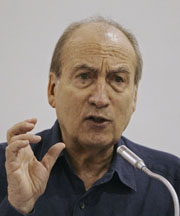Argentine writer and journalist Tomás Eloy Martínez, who died on Monday after a long battle with cancer, was ranked among Latin America’s most prominent intellectuals. Best known for his novels about former President Juan Domingo Perón and his wife Eva, Martínez cared deeply about press freedom and was a passionate advocate who helped scores of Argentine reporters, and was actively involved in CPJ’s efforts to campaign on behalf on Cuban imprisoned journalists.
Martínez understood the difficulties journalists face while working on dangerous assignments or under repressive regimes. In 1975, he was forced to flee Argentina after serious threats from a right-wing paramilitary group. He lived in exile during the dictatorship era, and returned briefly to the country after democracy was restored in 1983.
Soon after I came to CPJ in 2002, I learned to appreciate Martínez’s efforts on behalf of Latin American journalists. He was a key supporter of a 2004 CPJ campaign for the release of jailed Cuban journalist Manuel Vázquez Portal, a recipient of CPJ’s 2003 International Press Freedom Award, and the other 28 imprisoned Cuban journalists. On March 24, CPJ sent more than 600 appeals—including more than 50 from some of the most renowned journalists in Latin America—to Cuban President Fidel Castro calling for the release of Vázquez Portal.
Martínez was keen to support the campaign, and he was responsible for bringing some of the most influential Latin American intellectuals—including Mexican author Carlos Fuentes—onto the petition. In June of 2004, Vázquez Portal was released from jail. The Cuban author and journalist said that CPJ’s campaign was instrumental in getting him out.
Martínez supported another CPJ campaign calling for the release of Cuban imprisoned journalists on the fifth anniversary of Castro’s crackdown on dissidents. In late 2008, Martínez send me an e-mail expressing concern about the Nicaraguan government’s harassment of the country’s most influential journalist, Carlos Fernando Chamorro: “It seems like the persecution of journalists in Nicaragua has become more serious every day,” Martínez wrote. He then joined a group of prominent Latin American intellectuals to protest President Daniel Ortega’s attack on freedom of expression in Nicaragua.
